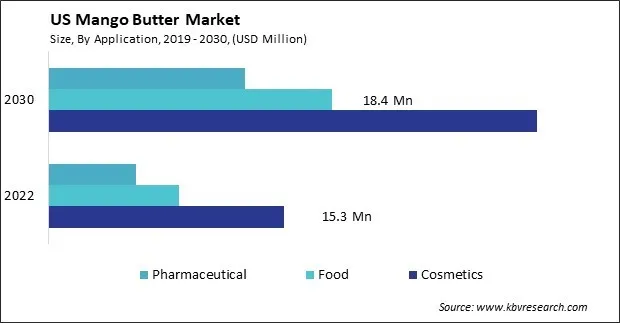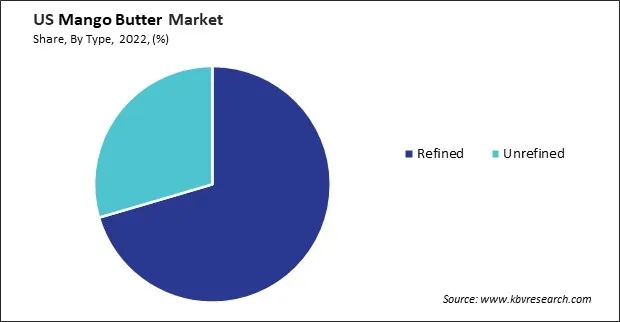US Mango Butter Market Size, Share & Trends Analysis Report By Application (Cosmetics, Food, and Pharmaceutical), By Type (Refined and Unrefined), and Forecast, 2023 - 2030
Published Date : 29-Oct-2024 |
Pages: 46 |
Report Format: PDF + Excel |
COVID-19 Impact on the US Mango Butter Market
The US Mango Butter Market size is expected to reach $62.8 Million by 2030, rising at a market growth of 10% CAGR during the forecast period. In the year 2022, the market attained a volume of 827.3 Tonnes, experiencing a growth of 10.4% (2019-2022).
The mango butter market in the United States has grown significantly recently. Mango butter, derived from the kernels of the mango fruit, is renowned for its moisturizing, soothing, and nourishing properties. It contains high levels of antioxidants, vitamins, and fatty acids, making it a popular ingredient in skincare formulations in the U.S. The versatile nature of mango butter allows its incorporation into a wide range of products, including lotions, creams, balms, soaps, and hair care products. Furthermore, the versatility of mango butter has expanded its application beyond traditional skincare products. It is increasingly used in hair care formulations, such as conditioners and styling products, due to its ability to moisturize and nourish hair strands, leaving them soft and manageable.

In the pharmaceutical industry, mango butter is valued for its medicinal properties. According to the Pharmaceutical Research and Manufacturers Association (PhRMA), in 2019, foreign direct investment in pharmaceuticals and medicines totaled $511.3 billion in the U.S. Mango butter is commonly used in topical ointments and creams in the U.S. for treating skin conditions such as eczema, psoriasis, and dermatitis. The soothing and anti-inflammatory properties of mango butter help alleviate itching, redness, and irritation associated with these skin conditions, making it a preferred choice for Americans seeking natural remedies.
The COVID-19 pandemic has had a mixed impact on the mango butter market in the U.S. The increased emphasis on personal hygiene and skin care during the pandemic has led to a surge in demand for skincare products, including those containing mango butter. With more Americans spending time indoors and focusing on self-care routines, the demand for moisturizers, lotions, and other skincare products has remained strong. However, the economic repercussions of the pandemic, such as supply chain disruptions and reduced consumer spending, have posed challenges for industry players. Fluctuations in raw material prices and logistical issues have affected the production and distribution of mango butter-based products.
Market Trends
Growing demand for natural ingredients
The mango butter market in the United States has experienced significant growth in recent years, largely propelled by the booming cosmetic industry's demand for natural ingredients. One of the primary drivers behind its increasing popularity is its natural composition. According to the International Trade Administration, in 2019, the U.S. experienced a steady annual growth of 2 % in its exports, culminating in a total of $15.02 billion within the cosmetics industry. Americans are becoming increasingly conscious of the ingredients they apply to their skin, seeking products free from synthetic additives and harsh chemicals. As a natural emollient, mango butter offers a safer and more sustainable alternative to traditional petroleum-based moisturizers, appealing to eco-conscious U.S. consumers and those with sensitive skin.
Furthermore, mango butter's versatility makes it an attractive ingredient for cosmetic manufacturers. Its creamy texture and high fatty acid content make it an excellent moisturizer, capable of nourishing and hydrating the skin without leaving a greasy residue. Additionally, mango butter is rich in antioxidants like vitamins A and E, which help protect the skin from environmental damage and promote a youthful complexion. These properties have led to the incorporation of mango butter into a wide range of skincare products, including lotions, creams, balms, and serums in the U.S.
The growing demand for natural and organic cosmetics has also fueled the expansion of the mango butter market in the U.S. With U.S. consumers increasingly seeking products that align with their health and wellness values, manufacturers are incorporating mango butter into their formulations to meet this demand. Therefore, the surge in demand for natural skin care solutions in the United States has propelled the growth of the mango butter market, driven by its natural composition and versatile skincare benefits.
Expansion of the organic food products industry
The organic food products industry in the United States has experienced significant growth in recent years. According to the U.S. Department of Agriculture, the organic food products industry in the United States experienced significant growth, with sales reaching $52.0 billion in 2021. Within this industry, the mango butter market has emerged as a notable sector due to its numerous health benefits and versatile applications.
One of the primary drivers behind the expansion of the organic mango butter market is the growing demand for natural and chemical-free personal care products. Americans are becoming more aware of the potential harm from synthetic ingredients in conventional skincare and haircare products. As a result, there has been a significant shift towards organic and natural alternatives, including mango butter, which is valued for its moisturizing, nourishing, and anti-inflammatory properties. Furthermore, the increased focus on sustainability and ethical sourcing practices has also contributed to the growth of the organic mango butter market.
Moreover, consumers in the U.S. are increasingly seeking products that are produced in an environmentally responsible manner, without the use of harmful pesticides or genetically modified organisms (GMOs). Organic mango butter, derived from sustainably harvested mango seeds and produced without synthetic chemicals, aligns with these preferences. Hence, the surge in demand for natural, chemical-free personal care products and the emphasis on sustainability have propelled the growth of the organic mango butter market in the United States.

Competition Analysis
Mango butter, derived from the seeds of the mango fruit, has gained significant popularity in the United States due to its various applications in skincare, haircare, and cosmetics. As consumer demand for natural and organic products continues to rise, the mango butter market has witnessed steady growth. One prominent player in the U.S. mango butter market is NOW Foods. NOW Foods offers a wide range of natural products, including mango butter, which is known for its quality and purity. The company focuses on sustainable sourcing practices and emphasizes using organic ingredients, catering to the growing demand for environmentally friendly products. NOW Foods has established itself as a trusted brand among consumers seeking natural skincare solutions, contributing to its success in the mango butter market.
Another significant player in the mango butter market is SheaMoisture, a brand under Sundial Brands, which is now owned by Unilever. SheaMoisture has built a strong reputation for its natural and organic skincare and haircare products, including those containing mango butter. The brand's emphasis on ethically sourced ingredients and its commitment to community empowerment have resonated well with consumers. SheaMoisture's presence in major retail outlets across the U.S. has further bolstered its position in the mango butter market.
One of the pioneering companies in the natural beauty industry, The Body Shop, also offers mango butter-based products in the U.S. mango butter market. Known for its ethical practices and advocacy for animal welfare and environmental sustainability, the Body Shop has attracted a loyal customer base. Its mango butter range includes body butter, lotions, and creams, which are popular for their moisturizing and nourishing properties. The Body Shop's strong brand image and extensive retail presence significantly influence the mango butter market.
Furthermore, Palmer's, a well-established skincare brand, is another key player in the U.S. mango butter market. Palmer's offers a diverse range of products formulated with mango butter, targeting various skincare concerns such as dryness, stretch marks, and uneven skin tone. The brand's heritage and long-standing reputation for effective and affordable skincare solutions have earned it a loyal following. Palmer's wide distribution network, including drugstores, supermarkets, and online channels, ensures widespread accessibility of its mango butter products. As consumer preferences shift towards cleaner and greener beauty products, the demand for the mango butter market is expected to remain robust, driving further innovation and competition.
List of Key Companies Profiled
- Hallstar Innovations Corp.
- Jarchem Innovative Industries LLC (Vertellus Holdings LLC)
- Avi Naturals
- Natural Sourcing Company
- Ekologie Forte Pvt. Ltd.
- Manorama Industries Limited
- Alzo International Inc.
- Henry Lamotte Food GmbH
- Madina Industrial Corp.
US Mango Butter Market Report Segmentation
By Application
- Cosmetics
- Food
- Pharmaceutical
By Type
- Refined
- Unrefined
1.1 Market Definition
1.2 Objectives
1.3 Market Scope
1.4 Segmentation
1.4.1 US Mango Butter Market, by Application
1.4.2 US Mango Butter Market, by Type
1.5 Methodology for the research
Chapter 2. Market Overview
2.1 Introduction
2.1.1 Overview
2.1.1.1 Market Composition and Scenario
2.2 Key Factors Impacting the Market
2.2.1 Market Drivers
2.2.2 Market Restraints
2.2.3 Market Opportunities
2.2.4 Market Challenges
2.2.5 Market Trends
2.3 Porter’s Five Forces Analysis
Chapter 3. US Mango Butter Market
3.1 US Mango Butter Market by Application
3.2 US Mango Butter Market by Type
Chapter 4. Company Profiles – Global Leaders
4.1 Hallstar Innovations Corp.
4.1.1 Company Overview
4.2 Jarchem Innovative Industries LLC (Vertellus Holdings LLC)
4.2.1 Company Overview
4.3 Avi Naturals
4.3.1 Company Overview
4.3.2 SWOT Analysis
4.4 Natural Sourcing Company
4.4.1 Company Overview
4.5 Ekologie Forte Pvt. Ltd.
4.5.1 Company Overview
4.6 Manorama Industries Limited
4.6.1 Company Overview
4.6.2 Financial Analysis
4.7 Alzo International Inc.
4.7.1 Company Overview
4.8 Henry Lamotte Food GmbH
4.8.1 Company Overview
4.8.2 SWOT Analysis
4.9 Madina Industrial Corp.
4.9.1 Company Overview
TABLE 2 US Mango Butter Market, 2023 - 2030, USD Thousands
TABLE 3 US Mango Butter Market, 2019 - 2022, Tonnes
TABLE 4 US Mango Butter Market, 2023 - 2030, Tonnes
TABLE 5 US Mango Butter Market by Application, 2019 - 2022, USD Thousands
TABLE 6 US Mango Butter Market by Application, 2023 - 2030, USD Thousands
TABLE 7 US Mango Butter Market by Application, 2019 - 2022, Tonnes
TABLE 8 US Mango Butter Market by Application, 2023 - 2030, Tonnes
TABLE 9 US Mango Butter Market by Type, 2019 - 2022, USD Thousands
TABLE 10 US Mango Butter Market by Type, 2023 - 2030, USD Thousands
TABLE 11 US Mango Butter Market by Type, 2019 - 2022, Tonnes
TABLE 12 US Mango Butter Market by Type, 2023 - 2030, Tonnes
TABLE 13 Key Information – Hallstar Innovations Corp
TABLE 14 Key Information – Jarchem Innovative Industries LLC
TABLE 15 Key Information – Avi Naturals
TABLE 16 Key Information – Natural Sourcing Company
TABLE 17 Key Information – Ekologie Forte Pvt. Ltd.
TABLE 18 Key Information – Manorama Industries Limited
TABLE 19 Key Information – Alzo International Inc.
TABLE 20 Key Information – Henry Lamotte Food GmbH
TABLE 21 Key Information – Madina Industrial Corp.
List of Figures
FIG 1 Methodology for the research
FIG 2 US Mango Butter Market, 2019 - 2030, USD Thousands
FIG 3 Key Factors Impacting Mango Butter Market
FIG 4 Porter’s Five Forces Analysis - Mango Butter Market
FIG 5 US Mango Butter Market share by Application, 2022
FIG 6 US Mango Butter Market share by Application, 2030
FIG 7 US Mango Butter Market by Application, 2019 - 2030, USD Thousands
FIG 8 US Mango Butter Market share by Type, 2022
FIG 9 US Mango Butter Market share by Type, 2030
FIG 10 US Mango Butter Market by Type, 2019 - 2030, USD Thousands
FIG 11 Swot Analysis: Avi Naturals
FIG 12 Swot Analysis: Henry Lamotte Food GmbH